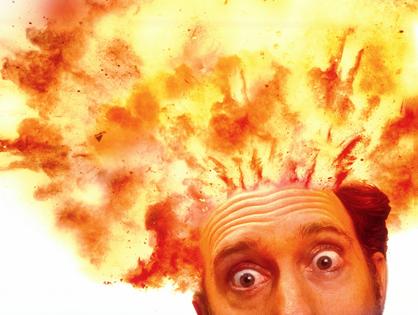Love it or hate it, nonliteral ‘literally’ is here to stay: Here’s why English will survive
Published in Political News
Few words so rile language purists as the use of the adverb “literally” in a figurative sense, as in, “That movie literally blew my mind.”
But as a linguist who studies how English has changed over the centuries, I can promise that, while it might feel like nails screeching on a blackboard, the use of nonliteral “literally” developed as an organic and dynamic outgrowth of the very human desire to communicate emotion and intensity.
The word literal first appeared in English in the late 14th century, borrowed from French. In turn, French “literal” came from Latin “littera,” with the original meaning of “pertaining to alphabetic letters.” It is this same root that delivered to English the words “literate” and “literature,” both harking back to the idea of knowing one’s “letters.”
In early English use, literal referred to the straightforward meaning recoverable from reading a religious text, as in this example from the Wycliffe Bible dating to 1383, “Holy scripture hath iiij vndirstondingis; literal, allegorik, moral, and anagogik.” The word literal as used here contrasts a direct – literal – reading of scripture’s meaning to other more symbolic or metaphorical ones.
By the late 16th century, though, literal begins to be used not just in reference to a type of reading but also as a way to emphasize that one wants one’s words to be taken literally.
This development is already a semantic leap in that, when used this way – as in, “John literally died of thirst” – the word provides no meaning contribution other than emphasizing to a listener that a speaker means it precisely as said. After all, assuming John did indeed die owing to a lack of hydration, what does a speaker really gain by saying “He literally died of thirst” versus simply “He died of thirst”?
The advantage is that using “literally” signals that what was said was unusual, unbelievable or remarkable in some way, steering a listener toward a literal rather than a perhaps more likely figurative interpretation.
After all, dying of thirst is not something you hear about every day, though suffering from thirst to the point where one feels like dying is a more universal experience. Such pragmatic enhancement of the word’s original meaning hints at how its modern marking of strong emphasis came into play.
The second piece of the puzzle of how “literally” became nonliteral requires a brief foray into how word meanings organically evolve over time as they are put to work by speakers.
A very germane example comes from “very,” a word in which its most common meaning – “extremely” – is but a shadow of its original sense.
In Middle English, “very” carried the meaning of “actual” or “true,” as in being “verray in worde and dede” – that is, true in word and deed. Yet, when something is true, particularly when used in its “actual” sense, it suggests that it embodies the highest degree of whatever quality is described as true.
So, for instance, if someone is a “true fool,” they exhibit such a high degree of foolishness they are taken for an actual fool. Used this way, two distinct but related meanings – “true” and “to an extreme degree” – come to coexist.
By the 16th century, intensity rather than trueness had become the word very’s primary sense, through a process that linguists refer to as “semantic bleaching.” Interestingly, words whose meanings involve truth, such as very, really and truly, are particularly prone to semantic bleaching. And “truth,” as in “exactly as said or written,” takes us back to “literally.”
Recall that “literally” once pertained only to contrasting a literal versus metaphorical reading.
But, as with “very,” by the 16th century, its meaning shifts away from this purely referential meaning to a more rhetorical one: “Literally” had shifted to emphasizing a speaker’s literalness and flagging it as remarkable in some way.
At that point, providing expressivity rather than a true or literal reading had become its primary role. Just consider an argument between spouses, where one says “I literally called you three times.” The purpose of “literally” here is really only one of underscoring the implication that calling three times was excessive and unusual.
From there to hyperbolically saying “I was literally dying of thirst” is just one step further down the road of semantic bleaching. The figurative reading becomes more and more possible, as speakers capitalize exclusively on the expressive force rather than the word’s former shell of literality.
This is really no different than saying something like “I am truly dying over here” when one is frustrated, but is, in fact, not actually dying. It is intensity conveyed, not imminent death, as “truly” has moved from marking truth to marking emphasis.
But what of using “literally” to mean something seemingly contradictory to its original meaning?
On that front, it is certainly far from the first word in English to have shifted toward its opposite. For instance, when in 1667’s “Paradise Lost” John Milton writes, “The Serpent … with brazen Eyes And hairie Main terrific,” the word “terrific” is absolutely intended in its original sense of “terrifying”“ as opposed to our modern "fabulous” take.
Sometimes, conflicting senses even exist at the same time. Think of how “clipping” can be about cutting something away or pulling something together. Likewise, consider the often oppositionally employed verb “to cleave,” with which one either tears apart or sticks together. In this bigger semantic picture, using “literally” nonfiguratively is really nothing to get worked up over.
The gist is that language changes because of how it finds itself most gainfully employed by speakers as it winds its way through time.
Literally’s main problem is that, unlike “terrific” or “very,” its semantic past has not yet faded from collective memory. But for those who still cling to its literalness despite the fact that Frances Brooke, Charles Dickens and Mark Twain all embraced its figurative glory, it may simply be time to literally let go.
This article is republished from The Conversation, a nonprofit, independent news organization bringing you facts and trustworthy analysis to help you make sense of our complex world. It was written by: Valerie M. Fridland, University of Nevada, Reno
Read more:
Misspoke: The long and winding road to becoming a political weasel word
Presidential pauses? What those ‘ums’ and ‘uhs’ really tell us about candidates for the White House
From ‘dada’ to Darth Vader – why the way we name fathers reminds us we spring from the same well
Valerie M. Fridland does not work for, consult, own shares in or receive funding from any company or organization that would benefit from this article, and has disclosed no relevant affiliations beyond their academic appointment.


































































Comments